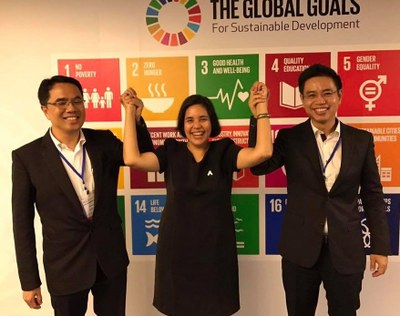In Defense of the Environment: Trailblazing Woman Judge Leads the Charge
Dr. Suntariya Muanpawong is a longstanding champion of the environment. A judge and Secretary to the First Vice-President of the Supreme Court of Thailand, she one of the growing number of women judges who are committed to environmental jurisprudence. Her relentless efforts inspire.
“The law is the backbone to combat wildlife trafficking and conserve the environment. We should ensure responsiveness of the courts, the executive and the legislative in the many facets of development and how it affects the ecosystem that sustains us,” said Judge Suntariya.
Judge Suntaria plays many important advisory roles in the government and has consistently been an advocate for wildlife conservation. She is a lead author in establishing the Environment Court of Thailand, which was passed by the National Reform Assembly and the National Reform Steering Assembly of Thailand, and endorsed last year to the Thai Cabinet for review. In 2015, she co-facilitated the workshop that developed the Association of Southeast Asian Nations (ASEAN) Handbook on Legal Cooperation to Combat Wildlife Crime, which was co-organized by the United States Agency for International Development (USAID), United States Fish and Wildlife Service (USFWS), United Nations Office on Drugs and Crimes (UNODC), the National University of Singapore (NUS) and the ASEAN Wildlife Enforcement Network (now called the ASEAN Working Group on CITES and Wildlife Enforcement).
“Partnerships and cooperation are crucial, and understanding best practices in the region and elsewhere is the norm in policy making. I appreciate our partnership with USAID and other partners in supporting judicial networking and cooperation to protect the environment,” Judge Suntariya said.
She also believes that senior judiciary have the responsibility to help shape interpretations of environmental law by setting decisions, rules and directions for lower courts to carry out. “The senior judiciary has influence on judicial education. The judiciary influences the courts, the way the legal system operates, and the way that lawyers, private sector, and public understand legal framework and how it should be enforced,” she said.
Prior to her current role, Judge Suntariya was the Secretary of the Environment Division and concurrent Research Judge of the Research Justice Division. During her tenure as Environment Division Secretary she managed many innovative initiatives, and proposed novel judicial policies to enhance the role of Thailand’s judiciary in conservation and environmental protection. She gives environmental law lectures at the Judicial Training Institute and many leading law faculties in Thailand. Recently, Judge Suntariya was appointed member of the Working Group on "Justice for the People” of the National Reform Council, a cabinet-level consultative body tasked to develop a five-year action plan for the Royal Thai Government.
“This is an excellent opportunity for me to be the voice of the voiceless, in the name of trees, wildlife, rivers and seas of Thailand in the halls of policy making bodies -- both in the judiciary and the executive,” she said.
The Supreme Court of Thailand is the key Thai government counterpart for the USAID Wildlife Asia project and Judge Suntariya played an influential role in making that happen. The project also collaborates with the U.S. Department of Justice, U.S. courts and the Asian Judges Network on the Environment (AJNE) to draw-upon judicial best practices. The Supreme Court of Thailand and USAID partnership builds awareness within the Supreme Court and its specialized divisions and courts, develops wildlife-specific curriculum development for the Judicial Institute, supports research on judicial policy innovations and best practices and promotes field visits to courthouses within wildlife crime hotspots in Thailand.


